John Hurrell – 20 January, 2020
The scarf is a ubiquitous garment these days, especially with the conspicuous visual presence of Muslim, Sikh and other religious communities. Scarves (or hijabs or dastaars) are designed to warm, protect and to hide—but they can also entangle or strangle. Thus the eco-political poetic dimension.
Pakuranga
Karen Rubado
Under Intense Scrutiny
8 December 2019 - 15 March 2020
Using its title as a prompt, this multi-coloured hand-woven band—a long strip of shredded and recycled soft plastic made into a huge scarf that has been swirled, folded, and flattened when pinned against the Te Tuhi Drawing Wall—makes you look closely into the intricate weft of the chopped-up lines to detect mutilated letters and eviscerated branding logos; a complicated flowing river of butted fragments held in position by the even finer warp.
The scarf is a ubiquitous garment these days, especially with the conspicuous visual presence of Muslim, Sikh and other religious communities. Scarves (or hijabs or dastaars) are designed to warm, protect and to hide—but they can also entangle or strangle. Thus the eco-political poetic dimension. Six families have contributed the many soft plastic bags shredded and woven for Rubado’s sculptural recycling.
The funny thing is that because of the parallel linear rhythms (a sort of ever-present ‘grain’) the meandering band looks like a kind of extruded bar-code, bending and twisting around on the wall like a python that fell under a steamroller and got squashed—to be transmuted into a beautiful (very delicate) collage.
Oddly enough, even if you were one of those very rare (understandably unpopular) people who didn’t give a toss about global warming and climate change, you could still enjoy the morphology of Rubado’s process—if you were an aesthete reactionary. You could formally enjoy its innovation and exploration of beauty: its odd form of spectacle and fine detail; its processual pushing of art boundaries.
Rubado, though, is not the first artist to explore soft plastic as a recyclable material—both Ani O’Neill and Julia Morison for example have used them for different projects—but with the shredding and linear juxtapositions a new sort of digital allusion has crept in to accompany the alarm with global warming and polution. Another semantic dimension so pertinent to our time.
John Hurrell
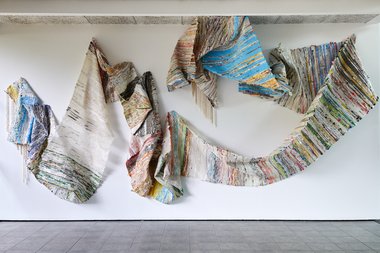


 Two Rooms presents a program of residencies and projects
Two Rooms presents a program of residencies and projects Advertising in this column
Advertising in this column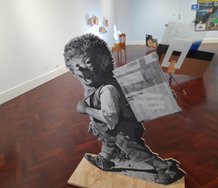
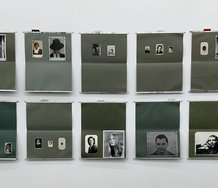
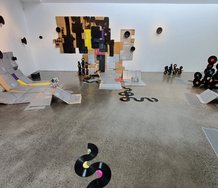
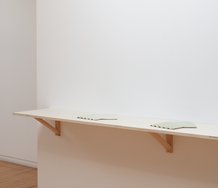
This Discussion has 0 comments.
Comment
Participate
Register to Participate.
Sign in
Sign in to an existing account.